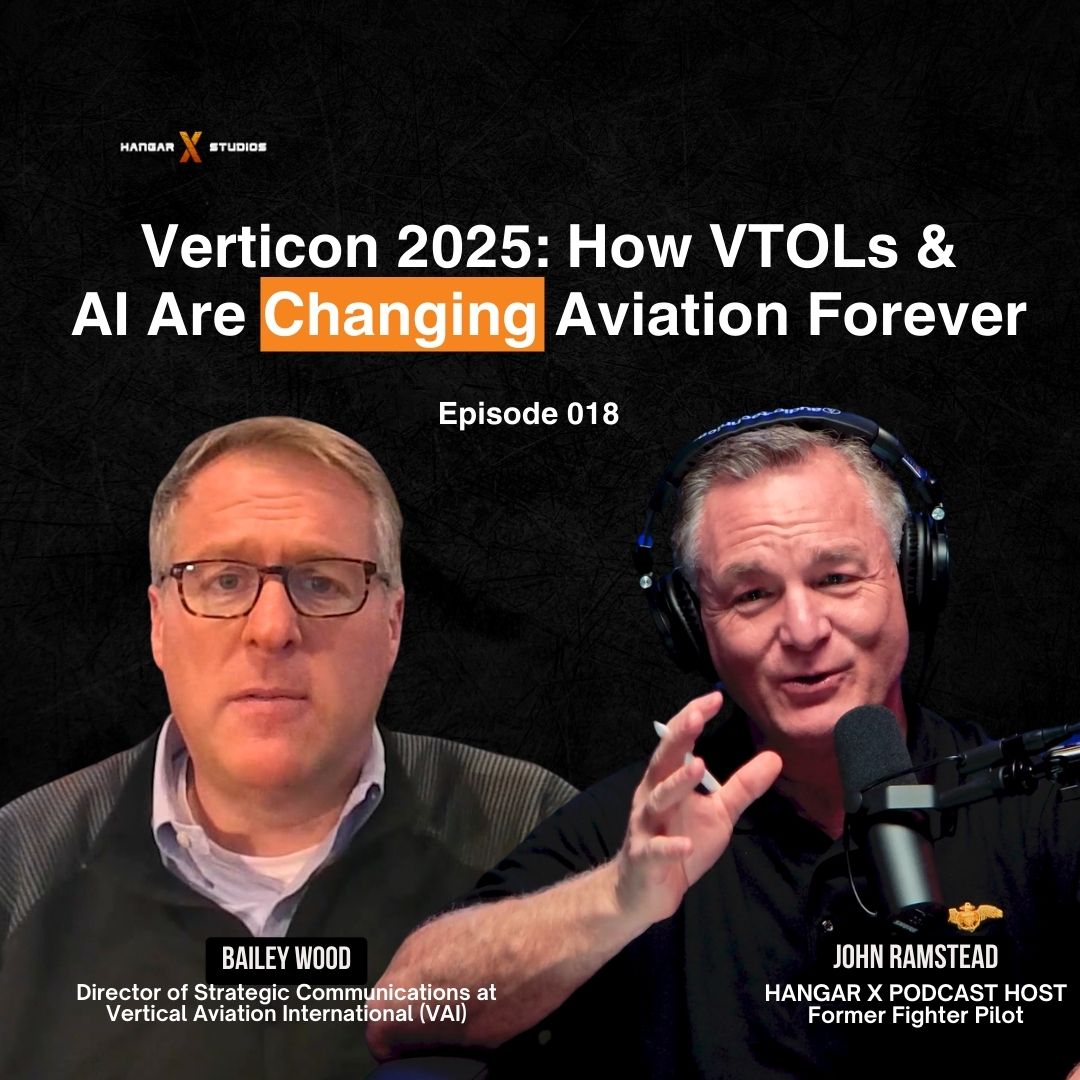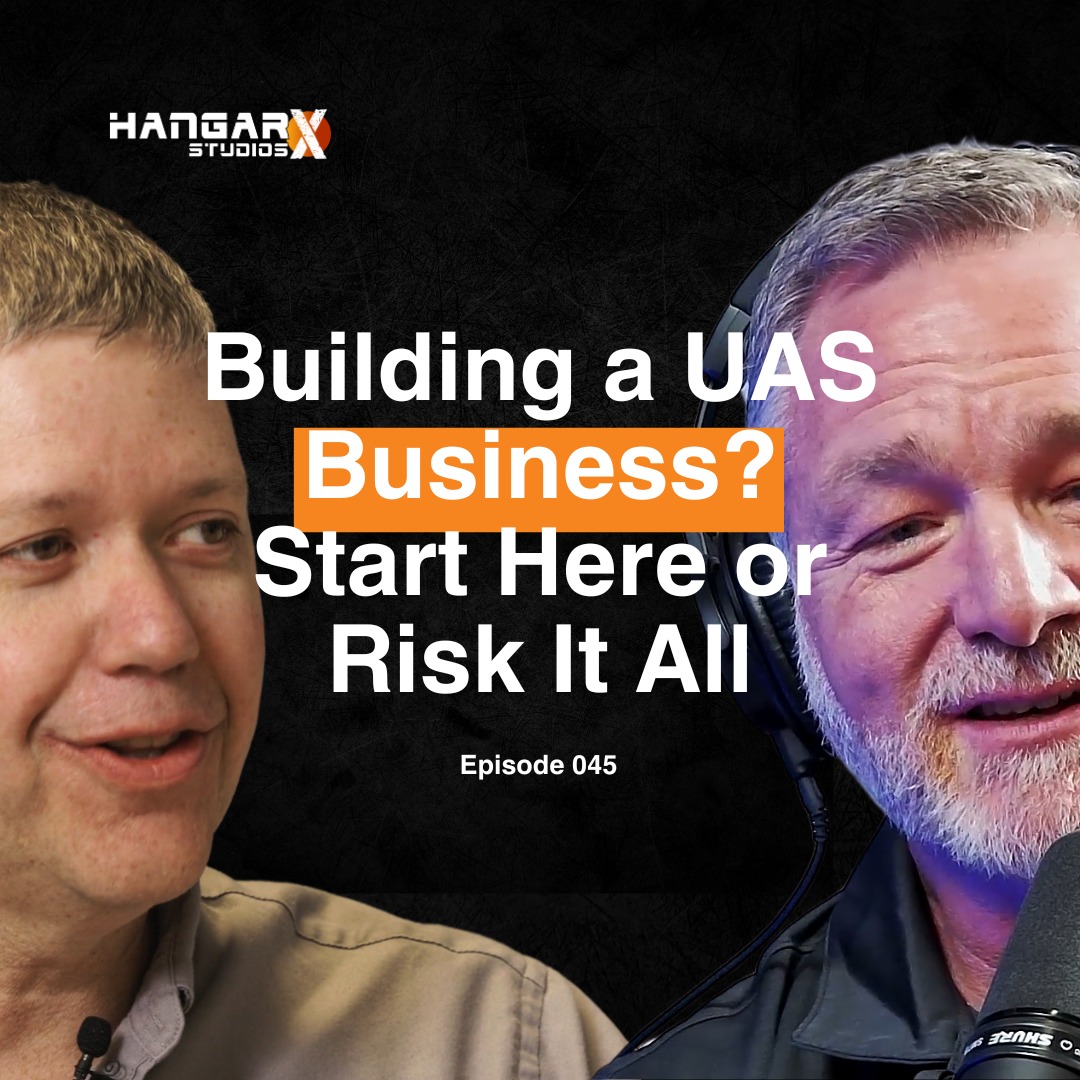Episode Transcript
[00:00:03] Brian Foley: There's. There's good things for the evtol sector. We're seeing a little bit of a culling of the herd, maybe. So for those remaining, maybe they have a little, little better shot with less competition out there.
[00:00:16] Intro: Welcome to Hangar X Studios, where former fighter pilot and host John Ramstead takes us on a journey across aerospace as it enters an historic period of innovation and transformation.
Our guests include aviation experts, pilots, financiers, military leaders, and innovators of all types.
Buckle up for another episode of Hangar X.
[00:00:46] John Ramstead: All right. Welcome to the HangerX Podcast. We're here live at Verticon with Brian Foley. Brian, welcome to the podcast.
[00:00:52] Brian Foley: Hey, John. Tonight, the Spear.
[00:00:53] John Ramstead: So this is a place where disruptors and innovators and investors all come together to learn the information that we need before the rest of the world needs to know. And that's why we have you on today, because you're a business analyst, financial analyst. You've been on both sides of the transaction. Aviation, do deep research. You're a contributing author to Forbes. And what are some other elements there, though? There's a lot in your background.
[00:01:18] Brian Foley: I don't know. I think that just about covers it.
No, I've been fortunate. I've been in aviation all my life, either in the corporate world or off on my own. And I've had the opportunity to stick my nose in a lot of different aspects of it from rotorcraft here. I worked at Falcon Jet for many years. I worked at Boeing for many years. So you kind of have a nice exposure to all of that.
[00:01:39] John Ramstead: Yeah, and I like, you know, you do deep research not only on what's in the industry, but also on the deals, the investor side of things. You've brokered some deals. Like, you really have a nice figure. And what I like about your writing, it's Brian Foley, if you guys want to search. Brian Foley, because I like how you write with a really good point of view.
It's very factual. Sometimes it can be almost countercultural because you stick to the facts versus trying to have a spin. Is that fair?
[00:02:08] Brian Foley: Thank you.
It does come back at me sometimes.
[00:02:11] John Ramstead: I'm sure it does. But you know what? That's the kind of information I like, and I'd like to maybe start here. What is, you know, right now, aerospace is growing. There's a lot of talk from private jets to the announcements that are here at Verticon and helicopters and EVTOls. But what is, you know, the investor class, from family offices to institutional capital. What does that landscape look like right now in Your opinion?
[00:02:34] Brian Foley: Well, let's start at the top with the EVTOL investors.
You know that there was kind of a rush to that a number of.
[00:02:41] John Ramstead: Years ago, the big SPAC craze and it created just a ton of capital that came in and found founded a lot of startups.
[00:02:47] Brian Foley: Yep. And you've got it. And the reason was because investors had huge sums of money that they weren't going to put in a passbook Savings account at 0.25%. They wanted to invest it out there in hopes of a better return.
And what better way than aviation because they could park a lot of money there instead of having to invest in, you know, many different places.
Fast forward to today, you can see there's been some changes in the landscape of those who have kind of come and gone and investors I think didn't really do their complete due diligence and maybe didn't know that aviation's a little different animal. And with certification it can be not a 3 to 5 year flip like a lot of them are used to, but it can be a multi decade endeavor depending on the complexity.
[00:03:36] John Ramstead: Well, in aviation too you can't sell a beta product, you can't sell the minimum viable product. It actually has to be the alpha, the FAA certified project. So that's very different than a lot of other investment landscapes. Also is that certification hurdle.
[00:03:51] Brian Foley: That's right. So if you're going to put bodies on it, you have to the bar is pretty high to be able to do that.
But down from, you know, those, those big investors.
You know, I'd like to encourage some of the folks listening maybe starting at the, at the bottom, if you need some money for your company or you have an idea for a company, you go out and you start with your friends and family from there. There's a class of angel investor it's called and seed capital and you begin working your way up into private equity and you know, vc. So there's, there's many different avenues and it really depends on the stage of your company, which one you'd approach for funding.
[00:04:31] John Ramstead: Yeah. And what, you know the let's.
I think just in the EVTOL space there's 200 entrants that are tracked through SMG. On his reality index there's about 30 that he believes are viable. So we had Sergio on the podcast, you know, if I don't have a flying prototype. So this is a, you know, that kind of investment. What's the appetite for those investors that are more or not appetite, you know, the venture investors, the Seed investors. What are they looking for right now, you think in a company where they're gonna put the capital at this kind of this risk profile?
[00:05:05] Brian Foley: Yeah, they're not looking for a sketch on the back of a napkin for sure.
They'll be looking at the management. They'll be doing their own marketing studies to see what the market potential is and come come to their own conclusion. So it's a little more sophisticated investor, I think that comes into that.
[00:05:21] John Ramstead: I think you're right. Now you've also done a lot of research on EVTOLs. It's been a big topic. There's been some big successes and some big failures recently.
What do you see? What is your outlook for the EVTOL space? I mean we're sitting right here next to Joby. We're looking at their prototype over here.
[00:05:36] Brian Foley: Exactly.
And I think I have to start by saying aviation is peculiar. We seem to eat our young. Whenever there's a new concept or idea, it gets poo poo pretty quickly.
I think the same thing happened with EVTOLs and maybe it was a little oversold to begin with, but going forward I feel that there will be a need, it'll be a niche need and we'll see initially them performing in cargo operations maybe autonomously.
[00:06:07] John Ramstead: Like the Elroy Air.
[00:06:09] Brian Foley: Exactly, that sort of thing. That's where it would start. The military would be a good start too because they write their own rules, they don't have to worry about FAA certification. So we could see some adoption there and from there it'll spread. I mean there's some good things to say about EVTOLs with the electric ones if you want to start there with the long term cost to maintain them is a lot lower than traditional.
But that said, there seems to be a shift in thinking nowadays as far as electrification of vehicles with the new administration, you know, pulling out of the, for example, the Paris agreement, you know, on climate change, there isn't, I don't think there'll be as big of a push to move in that direction in the future. And for that reason maybe hybrid and even traditional turbine engines still have a life ahead of them.
[00:07:09] John Ramstead: Yeah, you know, you know, I think one of the enabling, you know, dynamics for EVTOL is going to be the infrastructure vertiports, you know, in urban areas.
And you know, we had Rex Alexander on to talk about that and I didn't realize the weight and the cost and he also had an opinion that nobody's ever going to allow you to put a vertiport on top of a building.
Because think about the, you know, the Tesla fire after, you know, you know, recently took six hours to put that out.
So who wants to charge a battery pack on the top of a building? I don't know.
So some of those made sense. But I'd love to maybe your thoughts on some of these enabling things that are going to allow EVTOLs to actually be practical.
[00:07:52] Brian Foley: Yeah, there's so many challenges like that. Not only infrastructure, but the airspace infrastructure and how to handle that.
You know, there's been some articles written recently on the downwash speeds produced by some of these which might be, you know, pretty speedy and dangerous in, in some regulators mind there's always going to be one more challenge or obstacle. You know, flight in icing, for example, you know, what, what do you do then?
So the, the challenges are great but again if we take baby steps again maybe with moving some boxes first and then in the military finding an application there or it's not so stringent from the regulatory front, we'll learn from that and have a good, good way to roll it out to the civil side as well.
[00:08:38] John Ramstead: Yeah. Now let me ask you about this too because you know, there's almost this continuum. We have like unmanned, you know, drones and we have evtols, everybody knows kind of the helicopters operational requirements and then we have this big leap over to commercial aviation, turboprops and jets. And in the middle I think there's an area that's developing that we call extended VTOL or XVTOL which is let's say VTOLs that can take off from heliport but they have more of a 202,000 mile range and there's about two or three entrants into that space that are all developing aircraft. What potential do you think that has to transform the landscape?
[00:09:12] Brian Foley: I think the EVTOL industry will be very nichy and you don't want to try to be everything to everyone.
And they'll be those providers that find their niche and they'll exceed at it and they'll find a little market share by doing that.
[00:09:29] John Ramstead: And how about that extended VTOL that doesn't necessarily need a vertiport, it can land on a Runway or in a field where do you think that helps maybe change the narrative?
[00:09:39] Brian Foley: I think we have a little analogy to that with the beta folks and granted they're not a vertical takeoff, but they're again back to my baby steps. They're doing a conventional takeoff aircraft first and have a second program to follow that, that is an evtol. So I think that's one of those programs that are high on the list that could succeed. And if that's the case, goes to your point that there is a need for longer range than some of these short, short hop inner city evtols.
[00:10:13] John Ramstead: Yeah, I think Beta's approach is fascinating. If you. And by the way, if you know anybody at Beta, we'd love to have them on the podcast.
So another question, because you brought up Paris Climate Accord, so not to get political, but I would like to know from your opinion, because I know you study these things. There's policies though that are coming out of this administration, good, bad or otherwise. We can debate that. But what do you think the practical impacts of some of these policies and positions are with this administration and how they're going to affect aerospace ownership, aircraft development?
[00:10:47] Brian Foley: Yeah, I'll address it from the private aviation standpoint and it spills over into rotorcraft as well.
But in no particular order we were talking about earlier, there's a chance that the 100% bonus depreciation will come back, which really juiced the market a few years ago when it came into being. It's since been reduced and so you don't have the quality quite the tax benefit.
We'll have a commander in chief that hopefully won't use the state of a State of the Union address to attack private aviation and basically say that, you know, it's the end of private aviation, private jet tax breaks, you know, in front of millions. You know, the industry was singled out.
The current administration knows business aviation. They've been using it, you know, helicopters and fixed wings for years and they understand the benefits of it.
In addition, on the climate aspect, hopefully owners won't be at risk of shareholders and climate activists for flying a business jet or helicopter as much as they were in the past because maybe the temperatures come down with the US Leaving the Paris Accord.
There's other things that could be a bonus from this. We see the IRS being pulled back a little bit.
For those that weren't familiar, the IRS were sent to go to business jet operators to do complete audits on them after the State of the Union address.
So hopefully that'll calm down a little bit and maybe maybe go away because.
[00:12:28] John Ramstead: By and far I wasn't aware of that. So FBOs and operators were targeted specifically.
[00:12:34] Brian Foley: Actually owners of business aircraft.
So yeah, they had to come and break out the books and justify to the irs.
So hopefully that'll slow down a little bit. So there's some benefits that could happen from the current changing of the guard yeah.
[00:12:50] John Ramstead: Well, Brian, I love your point of view on all these different things. So as we wrap up, just any final thoughts, anything that's bubble up, if you kind of look at the year ahead, what's maybe something that as a.
A researcher, journalist, investor, that has you maybe most excited?
[00:13:08] Brian Foley: Yeah. So most folks can never be busy enough. But you know, if we look back, the helicopter industry, you know, from here at verticon has been fairly steady the last number of years. Granted, it's not back to the pre 2008 financial crisis when it was really going gung ho, but it's steady and stable now at least.
Same on the business, aviation side, there's business jets, deliveries that you know, are back to where they were before things slowed down during COVID So there's. There's good things for the evtol sector. We're seeing a little bit of a culling of the herd maybe. So for those remaining, maybe they have a little, little better shot with less competition out there.
[00:13:52] John Ramstead: Yeah. All right. Say, well, I'd love to stay in touch. I'd love to. Is is, you know, you have some updates or if you have any research insights or, you know, things maybe shift in the investment world, please reach out. Love to have you on the podcast anytime, Brian. I always love reading your stuff and it's been great to have a conversation with you.
[00:14:09] Brian Foley: Okay, me too.
[00:14:10] John Ramstead: All right. Keep knocking them alive, brother.
[00:14:11] Brian Foley: All right, Good show.
[00:14:12] John Ramstead: Okay, thanks.


